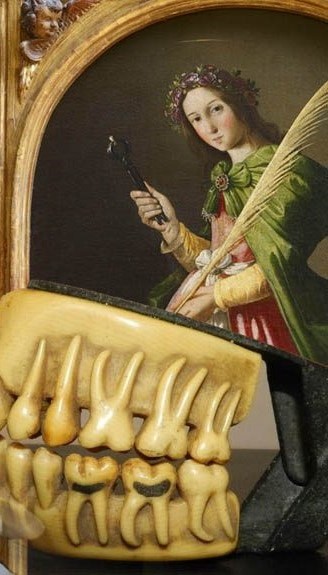
(For the audio version of this blog, please visit: https://brothersinchristcmf.org/wp-content/uploads/2024/06/Mass-Blog-for-the-11th-Sunday-of-Ordinary-Time-2024.mp3)
You might think something tiny and insignificant—even if it came from something grand and majestic—would have little intrinsic value. Take a factoid, for example. Like the tiny cedar shoot and the minuscule mustard seed at the center of this Sunday’s readings (Ez 17:22-24 and Mk 4:26-34), a factoid devoid of its context might seem insignificant, and therefore, disposable. But what if it’s planted in fertile soil?
Let’s examine a factoid related to something truly irrelevant in this age of titanium dental implants: the plastic partial denture. Many scholarly papers were written about this means of bridging gaps in the smiles of mid-20th Century people. But with the invention of implants, a 21st century dental student—or any student of philosophy—might have trouble finding much value in researching the art of partial-denture-making. Why would he or she even bother?
Because a tender shoot might be found in the scholarship of that era that, when transplanted into the right soil, yields timeless wisdom about care of the human smile.
Fifty years ago, a professor of prosthodontics (dentures) published his first and only scholarly paper in the Journal of Dental Education, titled: “Seminar Approach for Teaching Removable Partial Denture Diagnosis.” This professor has long since passed on, as has his paper. In fact, his insightful piece only exists in the Journal’s archives—and is not getable via the world-wide-web.
Again, why would a dentist in development bother looking for it? Because like a mustard seed, a spec of wisdom at this article’s core still has great growth potential. Its original target audience was any undergraduate sophomore focused on saving the smiles of future patients who might not be good at communicating their needs.
“The adaptability of the patient often overcomes evidence of potential partial denture failure,” this professor advised in his article, “so by its improper design, the partial may have already started a slow, systematic breakdown of the oral tissues in such a patient’s mouth [before he or she hurts enough to complain].”
The point for all students of life? LEARN TO SEE AND FEEL FROM ANOTHER PERSPECTIVE!
Such empathy requires a multidisciplinary approach, and goes beyond partial knowledge to complete wisdom.
“Since knowledge of other disciplines is essential,” the professor concluded in his article, “a dental student should correlate with material from other courses. This way, even at the sophomore stage, a student can feel he is actually doing something in clinical dentistry that is relevant to his future.”
Turns out, this professor—a devout Catholic as well as an insightful professor of science—wrote an article on a seemingly outmoded topic that contains a seed with eternal viability. He shared its wisdom with his own children, as well, teaching it from the perspective of dentistry’s patron saint: Apollonia. She was tortured for her faith by persecutors who violently extracted and shattered all of her teeth. Today, to those seeking comfort from dental problems, she is considered the patroness of dentistry.
When publishing his piece 50 years ago, although not mentioning Apollonia in it, this dental professor was hoping future students would walk by faith as this saint did, and therefore do something great with what he taught them. Paul hoped the same for his students in Corinth, as evidenced by the letters he wrote them. The one we read this Sunday (2 Cor 5:6-10) might have been discarded centuries ago, had future generations not seen its eternal relevance:
“While we are at home in the body we are away from the Lord, for we walk by faith, not by sight. Yet we are courageous,” Paul writes.
Wisdom and courage start as tiny seeds that, when planted in the right hosts, give bearers the faith to seek nourishment from this world’s most humble teachers. That’s how truth grows big enough for even the blind to find.
–Tom Andel
Our faith is the beginning of whatever courage and wisdom the Lord grants us. I often grapple with the “force” of the spirit deposited in us at our Baptism and reinforced in the Sacrament of Confirmation.
The Holy Trinity is difficult to understand as the wisdom of God if far beyond our comprehension. Yet the Holy Spirit being co-equal to God the Father and our Lord Jesus, offers endless potential and opportunity for us mere mortals.
Imagine how much more ability and capacity for good would be ours by relying more on God and His Spirit within us? The church identifies 7 specific “gifts” available to each of us:
Wisdom
Knowledge
Understanding
Counsel
Fortitude
Piety
Fear of the Lord.
How can we tap into this enormous potential and capacity?
Perhaps we simply need to ask?
Amazing how those spiritual gifts survive us and remain available to new generations through the humblest sources–even an obscure dental journal. My dad’s spirit is smiling through Our Father.